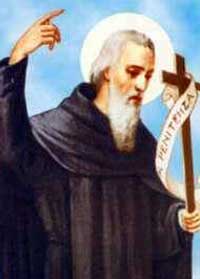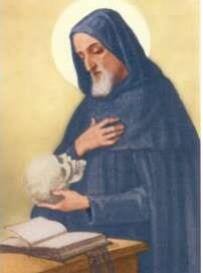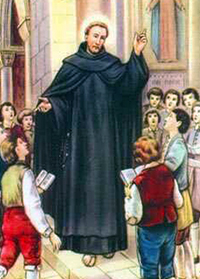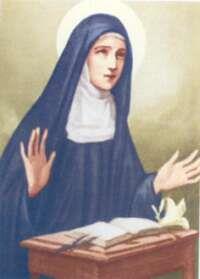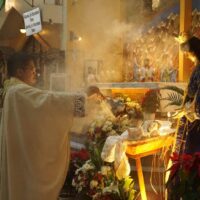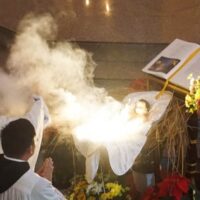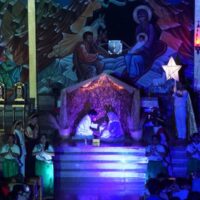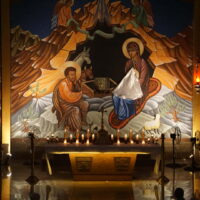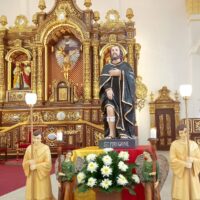James Philip was born in 1454 in Celle di Monte Chiaro in the diocese of Faenza, Italy. Because of a vow of his parents, he was associated with the Order at the age of nine.
He was note for his spirit of prayer and penance as well as his love for the Scriptures and the works of the Fathers of the Church.
Ordained a priest, his celebration of the sacraments demostrated his deep spirituality and love for the liturgy. He died in 1483.
His body rests in the cathedral of Faenza. Clemente XIII approved devotion to him in 1761.
From the Life of Blessed James Philip of Faenza by Nicolò Borghese (Nn. 1-6.8: Monumenta OSM, IV, pp. 64- 66)
He studied the gospel traditions and sacred writings with the greatest zeal.
 James Philip was born of virtuous parents of modest means. His father’s name was Miserino dalla Cella, his mother’s Domenica. Before embracing religious life, he was called Andrew. When he was struck by epilepsy at two years of age, his father prayed for a cure, making a vow to offer him to the Lord in religious life if he were healed. Already from earliest childhood Andrew visited churches on his own; he did not amuse himself with the usual sports and games of children. He was very timid and reserved by nature and loved solitude.
James Philip was born of virtuous parents of modest means. His father’s name was Miserino dalla Cella, his mother’s Domenica. Before embracing religious life, he was called Andrew. When he was struck by epilepsy at two years of age, his father prayed for a cure, making a vow to offer him to the Lord in religious life if he were healed. Already from earliest childhood Andrew visited churches on his own; he did not amuse himself with the usual sports and games of children. He was very timid and reserved by nature and loved solitude.
When he was about nine years old, his father-in order to fulfill his vow – sent him to the Order of Servants of the Blessed Virgin Mary. Born again in spirit and with a new name, afterwards he was called James Philip. Even though he was just a child, from the outset he distinguished himself by his obedience and singular observance of the rules; as an adult he frequently was given to fasting and keeping vigils. With zeal he studied the gospel teachings and Sacred Scripture. And he seemed to draw nourishment for long periods when he read the lives of the Fathers and the examples of chastity, obedience and humility of the saints. As a young man, he dedicated himself so completely to literary studies that he was able to understand easily and exactly the books of Christian and other excellent Latin authors. He was well versed in the ceremonial rituals of the Church and his Order and the rubrics of the divine office and he performed them all with precision.
He filled some offices in the community to the full satisfaction of his confreres. He was, in fact, affable, gentle and obliging by nature. He was never seen to sulk or be angry. With evenness of spirit he bore any offenses inflicted on him by others but he never offended anyone. He was at all times a man of few words, avoiding not only indecent ones but useless ones as well; if he happened to hear anything obscene in any conversation, his countenance would cloud immediately and he would admonish the wrongdoers with a brief reproof and leave them.
After ordination to the priesthood, no one was more devout or more reverent in celebrating with copious tears the sacrifice of the Mass; no one contemplated more deeply the mystery of the Cross when he held the Host in his hands. He hated idleness and called it the cesspool of all evils. He always took part in singing and celebrating the divine offices in choir with the other friars. The rest of the time he spent in his room in prayer and reading; sometimes, however, he eased the burden of his mind by weaving or designing inlaid veneer so that he was never unoccupied. He was accustomed for the most part to walk and meditate alone; he did so with eyes lowered. He read with great delight the works of Saint Jerome and other sacred books, but especially he took up often a volume about the passing, that is, the death of Saint Jerome. By this time, he was meditating only on heavenly things. He sustained himself more with heavenly virtue than with material food, so that he was eating only once a day and was content with a small ration of poor quality food. When called to task for this by his superior, he ate what was prepared for the community. On Fridays, however, in memory of the Passion of the Lord he dressed in a hair shirt and ate only herbs. He seemed to tolerate nothing with more reluctance than words of praise in his own regard. In our age it seems extraordinary that he would hide as much as he could his good works and excellent qualities. Although he was esteemed as good and upright by everyone, he was appreciated less by them than by God. Following the example of the Savior, he wanted, in fact, to be rejected and despised by others; and in the depths of his heart he desired nothing more ardently than to please God his creator and follow the path of our Redeemer.
As the final days of his life approached, bad health took hold of him and this he manifested more by his appearance than by his words. T o those who asked him how he felt, he replied, “Well, because the Lord wills it.” There was neither impatience nor regret in him in meeting suffering or death. Although he was ill, he did not take to his bed but moved around freely. The day before he died, he was present in church to sing Matins with the other friars and the day before that he celebrated Mass. The evening before his death he visited his confreres one by one; humbly he asked their forgiveness and begged that they might pray to God for his soul in their prayers the following day because, he said, he believed himself about to depart from the bonds of the body. The holy man was in the twenty-ninth year of his life when he returned a victor to the heavenly homeland. It was Sunday, 25 May, the feast of the Most Holy Trinity.
So thin was James Philip’s tall figure that the skin seemed to cling to his bones; the nose jutted out from his long face; the eyes were sunken, the neck elongated, the fingers like claws and he was of remarkably pale complexion.
Prayer
Father in heave, you richly endowed James Philip with a knowledge of divine truth and a heart on fire with love whenever he celebrated the Eucharist. Draw us to yourself, source of our wisdom and font of generous love. We ask through our Lord Jesus Christ.
 Diocese of Parañaque
Diocese of Parañaque

